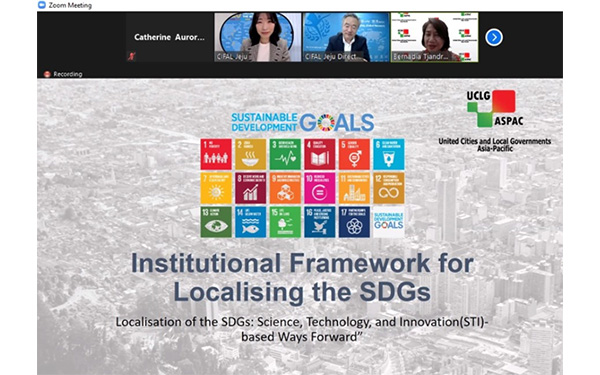19 February 2021 | THE United Nations Institute for Training and Research (UNITAR) CIFAL Jeju organised a webinar on “Localisation of the SDGs: Science, Technology, and Innovation (STI)-based Ways Forward.” UCLG ASPAC was invited as one of resource persons together with the Green Climate Fund (GCF), and United Nation Office for South-South Cooperation (UNOSSC). There were 20 registered participants of eight countries coming from various types of organisation including governments at national, state, and local leaders, international organisations, non-government organisations (NGO), and academia.
The Director of UNITAR CIFAL Jeju, Mr. Kyung Hoon SUL, gave his opening remarks stating his concern for local governments where the pandemic brings an uphill struggle for local governments to recover from the devastation.
Dr. Bernadia Irawati Tjandradewi as the Secretary-General of UCLG ASPAC shared the important role of local government in achieving the SDGs, as almost 65 percent of the SDGs’ targets must be done at the local level and it is at the local level that the interrelationship between all the global agendas must clearly manifest. She further elaborated that achieving the 2030 Agenda necessitates the full implementation of the New Urban Agenda that is fundamental to the achievement of the Paris Agreement of Climate Change and the Sendai Framework for Disaster Risk Reduction.
She also reminded that we only have less than 10 years to attain the SDGs and with the impact of COVID-19, it has become more important to accelerate the work that we do especially in this situation where most of the budget of local governments is allocated for COVID-19 pandemic response. She agreed that some regions have been progressing very fast, but she also pointed out that some goals are also stagnant, and some goals are even in regression.
She also acknowledged challenges towards improved function and management of cities to meet the SDGs targets, such as collaborative governance, fiscal decentralisation, legislative and policy reform, and urban management. According to her, it is important for national level government to create much more conducive environment for local governments to perform. Regarding the multi-level governance and multi-stakeholder partnership framework, she recommended considering the 4C approach: Coherence, Cohesion, Coordination (between national sub-national and local policies), and Cooperation (between all levels of governments and stakeholders); which can also be applied to the budgeting process.
Regarding budgeting, Mr. Andrey Chicherin as Head of Innovation, Technology Transfer, and Co-Funding Platforms Team from Green Climate Fund said that a substantial part of the Green Climate Fund portfolio is allocated to the Asia-Pacific region and they are looking forward to receiving more innovative and impactful projects.
This webinar also explored some relevant issues on community engagement and strategy in the part of South-South Triangular Cooperation. Dr. Denis Nkala, UNOSSC Regional Coordinator for the Asia-Pacific, mentioned that technology can do so much to the community, as in solar energy and water. The example of solar energy technology that can be given to the community is solar lighting, solar water heaters, solar-powered water desalination, and parabolic solar cookers. For the water technology, there are village hand pumps, rainwater harvesting, neer jaal (a water mapping website controlled and managed by rural communities). Dr. Denis also mentioned that there are some movements and ideas promoting community development in South-South Countries, such as the New Village Movement (Saemaul Undong) from the Republic of Korea, One Village One Product Movement from Japan, Sufficiency Economy Philosophy (SEP)/One Tambon from Thailand, South-South Network for Public Service Innovation (SSN4PSI) from Bangladesh, and Village-Owned Enterprises (BUMDes) from Indonesia.
He also shared that the focus areas of capacity development for poverty reduction through South-South and Triangular Cooperation in science and Technology include agriculture, education, health, water, and women empowerment (especially supporting technological application at the community level). According to him, those technologies and innovations for community-driven development have become more important to achieving the SDGs because the global agenda cannot be achieved without addressing development issues for the rural populations.
Addressing the technology and innovation, Dr. Bernadia Tjandradewi also shared roles of Science, Technology, and Innovation to advance the institutional framework of SDGs in the Asia-Pacific region. Firstly, technology and Artificial Intelligent will replace many routine processing jobs to support modern technology-based jobs in service industries. Secondly, technology creates a competitive advantage (for example, the application of e-governance, finance health, education, and knowledge services). Thirdly, technology supports the development of a better informed, inclusive, and digital economy. Lastly, technology advances civic engagement, knowledge sharing, and innovation in strengthening participatory urban governance. She further mentioned that although the COVID-19 has become a crossroad for us, the technology provides big opportunity for us to redesign the future we want.
Finally, Dr. Denis Nkala shared things that we need to do to enhance the community engagement and strategy for the way forward. According to him, it is important to work directly with countries to expand the local knowledge base, to work with the government to establish a strategic partnership with government entities driven by similar goals (ownership), and to work together to enhance multi-stakeholder communication and coordination.











